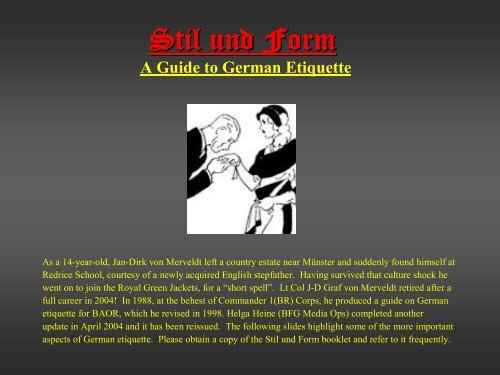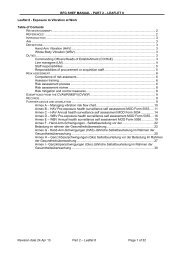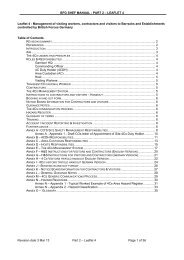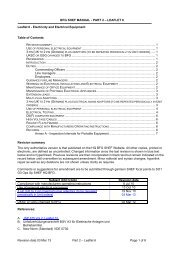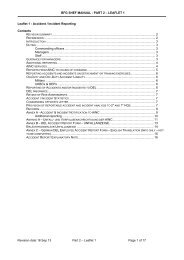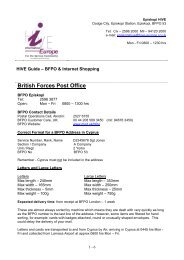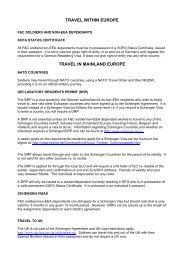Stil und Form Stil und Form - British Forces Germany
Stil und Form Stil und Form - British Forces Germany
Stil und Form Stil und Form - British Forces Germany
You also want an ePaper? Increase the reach of your titles
YUMPU automatically turns print PDFs into web optimized ePapers that Google loves.
<strong>Stil</strong> <strong>und</strong> <strong>Form</strong><br />
A Guide to German Etiquette<br />
As a 14yearold, JanDirk von Merveldt left a country estate near Münster and suddenly fo<strong>und</strong> himself at<br />
Redrice School, courtesy of a newly acquired English stepfather. Having survived that culture shock he<br />
went on to join the Royal Green Jackets, for a “short spell”. Lt Col JD Graf von Merveldt retired after a<br />
full career in 2004! In 1988, at the behest of Commander 1(BR) Corps, he produced a guide on German<br />
etiquette for BAOR, which he revised in 1998. Helga Heine (BFG Media Ops) completed another<br />
update in April 2004 and it has been reissued. The following slides highlight some of the more important<br />
aspects of German etiquette. Please obtain a copy of the <strong>Stil</strong> <strong>und</strong> <strong>Form</strong> booklet and refer to it frequently.
The Handshake<br />
People normally introduce themselves at functions and there will be occasions when you<br />
will have to do so. The accepted German etiquette is; "Darf " Darf ich mich bitte vorstellen?” vorstellen? ”<br />
(May I introduce myself?) immediately followed by your surname and a nd a handshake.<br />
Adding your rank and first name (in English) does help to alert people that you are not<br />
German and therefore serves as a sort of “warning “ warning” ”. . You will certainly find fellow<br />
German guests introducing themselves to you; typically with a quick qu ick handshake and a<br />
surname (i.e. Mü M üller). ller). Beware that it is often remarkably difficult to grasp the th e name and<br />
asking for it to be repeated is not at all rude. rude . When in uniform a salute is followed by a<br />
handshake (military headdress stays on).<br />
If in doubt always shake hands.<br />
Germans expect the man to greet the lady, the younger to greet the t he older and the<br />
subordinate to greet the superior. Germans arriving or leaving a function normally greet<br />
and say good good bye bye to all those present by shaking their hands. In mixed company compa ny Germans<br />
normally shake hands first with the ladies. Advice: Always shake sha ke hands with everyone.<br />
Where circumstances allow, the man is expected to stand up when being greeted or<br />
greeting. Guten Morgen, Morgen , Guten Tag and Guten Abend are the accepted forms of greeting. .<br />
In southern <strong>Germany</strong> “Gr “ Grü üss ss Gott" Gott " is the customary greeting. On departing, Auf<br />
Wiedersehen combined with a handshake, is the norm.
<strong>Form</strong>s of Dress<br />
National characteristics and tradition have resulted in a different differ ent dress codes in<br />
<strong>Germany</strong> and it is therefore useful for us to know what is worn for f or various occasions<br />
and what it is called.<br />
English<br />
German<br />
Military<br />
Badges Rank<br />
Dienstgradabzeichen<br />
Cap Badge<br />
Combat Kit<br />
Headdress<br />
Leathers/Sam Brown/Cross Belt<br />
Medals “with Medals"<br />
Medals “Miniatures”<br />
Mess Kit<br />
No 1 Dress (no German<br />
equivalent)<br />
No 2 Dress/ Service Dress<br />
No 4 Dress (Summer)<br />
Working Dress<br />
Barett – Embleme<br />
Mützenabzeichen<br />
Feldanzug<br />
Kopfbedeckung<br />
Koppelzeug<br />
Orden/Ehrenzeichen<br />
Orden/Ehrenzeichen<br />
“Bandschnalle”<br />
Gesellschaftsanzug Galauniform<br />
Dienstanzug, weißes Hemd,<br />
Querbinder<br />
Dienstanzug<br />
Dienstanzug (Sommer)<br />
Arbeitsanzug
Plain Clothes (Men)<br />
Black Tie<br />
Blazer<br />
Casual<br />
Casual (sport)<br />
Country Dress<br />
Dark Suit<br />
Dinner Jacket<br />
Gloves<br />
Hat<br />
Informal<br />
Jacket<br />
Morning Coat<br />
Pullover<br />
Suit<br />
Summer Dress<br />
Weatherproof<br />
White Tie<br />
Without tie<br />
English<br />
Smoking<br />
Blazer<br />
Freizeitkleidung/Sakko<br />
sportlich<br />
ländlich<br />
dunkler/gedeckter Anzug<br />
Smoking<br />
Handschuhe<br />
Hut<br />
Kombination, Blazer oder Sakko<br />
Sakko<br />
Cut (from the English “Cutaway”)<br />
Pullover<br />
geschlossener/gedeckter/Anzug<br />
Sommerlich<br />
wetterfest<br />
Frack<br />
ohne Krawatte<br />
German
For ladies:<br />
Cocktail Dress<br />
Day Dress<br />
Evening Dress<br />
Hat<br />
Summer Dress<br />
Trouser Suit<br />
Weatherproof<br />
English<br />
Ball Gown (with gloves)<br />
“County” for country sports<br />
Dinner Jacket/ Black Tie equiv.<br />
Evening Dress long<br />
Evening Dress short<br />
Gloves, long, short<br />
Ballkleid (mit langen<br />
Handschuhen)<br />
Cocktailkleid<br />
ländlich<br />
Kleid<br />
Cocktailkleid<br />
Abendkleid<br />
Abendkleid lang<br />
Abendkleid kurz<br />
Handschuhe, lang, kurz<br />
Hut<br />
sommerlich<br />
Hosenanzug<br />
wetterfest<br />
German
What to wear for what occasion? Wearing uniform at an official function is never<br />
out of place in <strong>Germany</strong>, indeed it is welcomed. It eases identification identi fication and <strong>British</strong><br />
uniform is regarded as smart, traditional, even exotic. Members of the B<strong>und</strong>eswehr<br />
will invariably wear Service Dress for daylight and early evening evenin g social events.<br />
<strong>British</strong> hosts and guests should always wear uniform at annual receptions re ceptions especially<br />
at Queen’ Queen ’s s Birthday Receptions.<br />
When inviting German guests, always indicate what the appropriate appropriat e form of dress<br />
might be. Similarly, do not hesitate to enquire after the appropriate appro priate form of dress for<br />
German functions.<br />
Dinner Jacket/ Black Tie. Many Germans do not possess a dinner jacket (Smoking ( Smoking) )<br />
and might refuse “Black “ Black Tie” Tie ” invitations. The female “equivalent “ equivalent” ” of Dinner<br />
Jacket/Black Tie in <strong>Germany</strong> tends to be very grand and could result res ult in a German<br />
guest being “overdressed<br />
“ overdressed” ” and embarrassed. You might wish to add ‘suit ‘ suit’ ’ (dunkler ( dunkler<br />
Anzug) Anzug ) to the invitation to indicate that those who do not possess a Dinner Jacket are<br />
welcome to wear a dark suit.
Presents<br />
It is traditional in <strong>Germany</strong> to bring a small present for one's hostess. Flowers are<br />
generally the most suitable present. When giving flowers, Germans Germa ns observe a number of<br />
conventions, which are worth knowing. Give the flowers to the hostess h ostess on arrival<br />
(normally by the man of a couple). Remove the paper wrapping before be fore entering the<br />
house. If in foil, leave the flowers wrapped. Tradition has it that an uneven number of<br />
flowers are given but not thirteen. Red roses and red carnations carnation s are regarded as a sign<br />
of love. White flowers in general and lilies in particular are for f or funerals. Don’ Don ’t t bring<br />
them to social occasions or when visiting a friend in hospital! A German hostess<br />
will “display “ display” ” your flowers for all to see. A <strong>British</strong> hostess might consider having<br />
some vases “at “ at the ready” ready ”. .<br />
Alcohol. A bottle of Whisky, Gin or dry Sherry is a welcome and somewhat somewha t different<br />
present from a <strong>British</strong> guest. It should be wrapped and might have ha ve a calling/visiting<br />
Card attached if there are many guests. <strong>Germany</strong> has more than her h er fair share of wine<br />
experts, so a degree of care is required when choosing wine as a gift.<br />
Official presents. SLOs will advise on official presents. Senior officers should<br />
be prepared to give and receive a small present when paying an official o fficial farewell visit. A<br />
regimental print or captioned photograph could prove a good alternative alte rnative to a plaque, of<br />
which many Ratshä Ratsh äuser user now have large collections.
Birthdays<br />
Birthdays are regarded as important in <strong>Germany</strong> and more fuss is made over them than in<br />
Britain. Coming of age (18th birthday) and “ro<strong>und</strong> “ ro<strong>und</strong>” ” birthdays 20, 30, 40 etc. are of special<br />
significance.<br />
Birthday List. Most German firms, organisations and the military maintain birthday bir thday lists,<br />
which will include BFG members either as contacts or customers.<br />
Birthday Visits. It is entirely appropriate to “call “ call” ” unannounced on a birthday with a bunch<br />
of flowers or small present. Those celebrating their birthday, especially a “ro<strong>und</strong> “ ro<strong>und</strong>” ” birthday,<br />
are usually “at “ at home” home ” between 1100 – 1300 and 1700 – 1800. It is a mark of particular<br />
attention and respect to call upon local dignitaries such as the Bü B ürgermeister rgermeister or Landrat on<br />
their birthday. The local SLO would advise on the date and should shou ld always be involved in<br />
such a visit.<br />
LEC birthdays. The birthdays of our Locally Employed Civilians should not be forgotten.<br />
(They rather expect them to be remembered.)
Weddings in <strong>Germany</strong><br />
Pre Pre wedding wedding Party (Polterabend). Traditionally, the Polterabend was for retainers<br />
associated with the bride and groom. It has become a pre pre wedding wedding party for friends, who<br />
might not be invited to the wedding. A Polterabend is noisy and quite wild, involving<br />
smashing crockery for good luck. By tradition the evening ends at midnight.<br />
Wedding (Hochzeit/ Trauung). An invitation to the "Empfang" (Reception) also means<br />
an invitation to the church service. The timings from ...to... (von/bis) of the reception are<br />
important to observe as it is usually followed by a wedding lunch lunc h or dinner for family and<br />
close friends. Unless invited to the lunch or dinner, one should shoul d leave the reception<br />
promptly.<br />
Dress at German weddings. Dark suit/short/cocktail type dress is entirely appropriate<br />
although in some circles the men wear a Morning Coat whilst ladies ladi es wear a short dress<br />
and hat. For BFG guests, Blues would never be out of place.<br />
Wedding presents. Exactly the same etiquette now applies to presents in <strong>Germany</strong> as a s is the<br />
case in UK.
<strong>Form</strong>s of Address<br />
In German, there is an intimacy associated with the use of a Christian Chr istian name and the “Du “ Du” ”<br />
form of address, which no longer exists in English. It is normally norma lly used in the family or<br />
after knowing someone for a long time and where a mutual agreement agreeme nt has been reached<br />
("Let's call each other by our Christian/first names"). Times are a re changing but calling<br />
Germans by their Christian names on meeting them can still cause offence. Call<br />
people by their surname and/or rank i.e. Herr Mü M üller, ller, Herr Oberst, Herr Oberst Mü M üller, ller,<br />
Frau Dr. Braun, Herr Bü B ürgermeister rgermeister etc. Men should not call women by their Christian<br />
name unless invited to do so. However children and teenagers are ar e called by their<br />
Christian names up to the time they come of age.<br />
The <strong>British</strong> military habit of referring to other military personnel person nel by their rank and<br />
first name has no equivalent in the B<strong>und</strong>eswehr. It may flatter “Colonel “ Colonel John” John ” to be<br />
referred to as such by the General but it will leave a German audience au dience wondering who is<br />
being talked about.
Punctuality<br />
Punctuality has been described as an “irritating “ irritating” ” German habit. There is a German saying<br />
“It “ It is better the guests wait for their food than the food for the th e guests” guests ”. . Whereas the<br />
<strong>British</strong> arrive “a “ a little after” after ” the time given, Germans believe that they should be there by<br />
the time given on the invitation or even well before. BFG guests guest s at a German function,<br />
particularly an official one, should make every effort to arrive on time.<br />
If early arrival is a German habit then knowing when to leave is not one of their virtues. In<br />
order to stop any confusion as to when an event is to end, it should sh ould always be indicated.<br />
The accepted format is to indicate Carriages/ Wagen on an invitation.
German Eating Habits and Table Manners<br />
Breakfast (Frü (Fr ühst hstü ück). ck). Breakfast usually consists of bread rolls (Brö (Br ötchen), tchen), a boiled egg, jam,<br />
cold meats, coffee or tea. Cooked breakfasts are uncommon in private pri vate houses but popular in<br />
hotels.<br />
Lunch (Mittagessen). Regarded by many as the hot or main meal of the day. It is served se rved a<br />
little earlier than the <strong>British</strong> lunch and is often quite substantial. substan tial.<br />
“Kaffee “ Kaffee <strong>und</strong> Kuchen” Kuchen ”. . Germans are keen on their afternoon coffee and (normally) home<br />
made cakes. Typically, guests are invited on S<strong>und</strong>ay afternoons.<br />
Evening meal (Abendbrot). The name given to an evening meal consisting of mainly bread<br />
and cold meats. Tea or beer is served with this meal. Abendbrot Abendbro t is usually eaten between<br />
1800 1900 1900 hours and is the main meal of the evening.<br />
Evening meal Late (Abendessen). A more formal evening dinner, which usually commences<br />
between 1900 2000 hours.<br />
Grace at table (Das Tischgebet). It is not uncommon, especially in a Catholic household, for<br />
grace to be said before and after a meal or at the start of a dinner di nner party.<br />
Enjoy your Meal (Guten Appetit). "Guten Appetit" is used to wish those present an enjoyable<br />
meal. Guests should not start eating until the host/hostess has wished them "Guten Appetit“ Appetit “. .<br />
Between courses and contrary to <strong>British</strong> table manners, it is the norm to keep one’ one ’s s hands “in “ in<br />
sight and away from swords” swords ” on the edge of the table.
German Drinking Habits and Manners<br />
Toasting is a very typical German tradition on almost every occasion. occa sion. German guests do not<br />
raise a full glass without “taking “ taking someone with them” them ”: :<br />
The host gives the signal to commence drinking by raising his glass. In mixed<br />
company this is usually accompanied by a bit of a ritual on the host’ host ’s s part who turns to<br />
the lady on his right (Tischdame) and nods to all his guests sitting si tting at the table with<br />
him. After drinking, the glass is not immediately placed on the table but “held “ held” ” whilst<br />
nods are exchanged with all those in the immediate vicinity. <strong>British</strong> Br itish hosts should be<br />
aware that German guests will wait for the signal to commence drinking dr inking so make life<br />
simple by welcoming everyone before you start drinking/eating.<br />
Recharging of a wine glass (Wein nachfü nachf üllen). llen). In <strong>Germany</strong> a wineglass is traditionally<br />
only recharged when it is empty and never when there is still something so mething in it. One<br />
should always give German guests the chance to empty their glasses glass es before recharging<br />
them. Equally <strong>British</strong> guests at a German function should be aware awa re that only empty<br />
glasses are recharged so drink up!<br />
Come aro<strong>und</strong> for a glass of wine (Auf ein Glas Wein kommen). This is a relatively common<br />
German form of entertaining a small group of friends or the couple coup le next door. If this<br />
happens, it is assumed you have eaten before arriving and German hosts offer a rather<br />
special wine.
Speeches (Reden)<br />
Speeches are an element of most official and private functions in i n <strong>Germany</strong>. Hosts welcome<br />
guests and official guests will normally reply (das Wort ergreifen). ergreif en).<br />
Speeches at official German Events. Those invited to any German event in an official<br />
capacity should always inquire discreetly, via the SLO, if they are expected to make a<br />
"Rede" (speech). Unless able to speak German well, speak English but try and avoid<br />
long sentences.<br />
Speeches at official BFG Events. German guests to official BFG functions, especially<br />
annual receptions and Queen’ Queen ’s s Birthday Parades/Receptions, expect to hear a short<br />
welcoming address and some statement of substance from their senior sen ior <strong>British</strong> host.<br />
Advice: Short speeches at official BFG events are a requirement. The content c ontent should<br />
be discussed with the local SLO and for senior officers, with the th e CSLO or Director<br />
BFLO(G).<br />
Speeches at the table (Tischreden). Short speeches of welcome, praise and thanks are<br />
often made by the host and the senior male guest at private and official functions,<br />
luncheons and dinners. Hostesses often announce what is about to t o be served, sometimes<br />
in remarkable detail. If you, as a <strong>British</strong> guest, are asked to reply on behalf of others,<br />
take your glass in the right hand, stand up and speak English (unless (u nless you have a very<br />
good command of German).
Invitations (Einladungen)<br />
The form of a German invitation differs little from the <strong>British</strong> although an “At “ At Home” Home ”<br />
invitation does not exist. The table below shows some typical translations: t ranslations:<br />
Anzug<br />
Beehren sich<br />
bei sich zu sehen<br />
bis (10.8.2004)<br />
Bitten<br />
Einzuladen<br />
gibt sich die Ehre<br />
U.A.w.g (Um Antwort wird gebeten)<br />
um (19 Uhr)<br />
Wagen<br />
Würden sich freuen<br />
zu einem Empfang<br />
zum<br />
German<br />
Adresse des Gastgebers<br />
am/auf den (10. August)<br />
Address of host<br />
on ... (Day) date (10 August)<br />
Dress or Suit<br />
request the pleasure of the Company of<br />
to see/request the pleasure of/at home<br />
reply by (date 10/8/04)<br />
request the pleasure of/ ask<br />
invite<br />
requests the pleasure of the Company of<br />
RSVP/ reply<br />
at (1900 hours) (use 24 hr clock)<br />
Carriages (desired Departure time for guests)<br />
request the pleasure of/ happy to see<br />
to a Reception<br />
to a . (Event)<br />
English
B<strong>und</strong>eswehr.<br />
Typical Events in <strong>Germany</strong><br />
Tattoo (Zapfenstreich). The "Zapfenstreich" is the traditional German military form<br />
of So<strong>und</strong>ing/Beating Retreat. Its origins are similar to our So<strong>und</strong>ing/Beating Sou nding/Beating Retreat<br />
although some troops will be on parade, carrying flaming torches (Fackeln). This is<br />
the major ceremonial event of the B<strong>und</strong>eswehr and only used as a farewell to<br />
General Officers or Armed <strong>Forces</strong> Ministers, national celebrations celebration s and State Visits.<br />
If invited, the correct form of dress would be No 1/No 2 Dress unless u nless otherwise<br />
stipulated.<br />
Biwak (Bivouac or Camp Fire). Strictly translated this is a get together aro<strong>und</strong> a<br />
campfire. It is an outdoor event with a campfire, military stands stand s and exhibitions<br />
where Combat Kit is appropriate. In most cases an entry fee is required r equired and food and<br />
drink are purchased. It is always an All Ranks event and serves as an open day for<br />
the families.<br />
Change of Command Ceremony (Kommandowechsel/Ü<br />
(Kommandowechsel/ Übergabeappell bergabeappell ). Change of<br />
Command Ceremonies are significant events in the German military calendar. The<br />
outgoing commander formally returns the command to his superior, who in turn<br />
hands it over to the incoming commander. Elements of the unit/ formation f ormation will be on<br />
parade accompanied by a band. Both outgoing and incoming commanders comman ders and the<br />
senior officer officiating make speeches. The parade is usually usuall y followed by a<br />
reception.
B<strong>und</strong>eswehr (continued).<br />
Swearing Swearing in/Oath/Solemn in/Oath/Solemn Pledge (Vereidigung). "Vereidigung" is the swearing swearing in in<br />
ceremony for National Service recruits during their basic training. traini ng. It is a family<br />
occasion and similar to a Passing Out Parade, sometimes accompanied accompan ied by a "Tag der<br />
offenen Tü T ür" r" (Open Day). If invited, SD is the appropriate form of dress.<br />
Unit Affiliations (Patenschaften). Patenschaften are regarded in the B<strong>und</strong>eswehr as an<br />
important socio/military form of contact with other NATO units/ formations and a<br />
degree of formality and ceremony is attached to these “Patenschaften<br />
“ Patenschaften” ”.They .They are<br />
expected to last beyond any Arms Plot move and BFG units should seek BFLO(G)<br />
advice before establishing any new affiliation.<br />
Fahnenband (Banner). The Fahnenband is a narrow stitched banner fixed as a<br />
decoration to the Truppenfahne or Regimental Colour. It was originally ori ginally presented for<br />
participation in particular battles or campaigns. Some BFG units unit s have been awarded<br />
either a Federal or Land Fahnenband on departing <strong>Germany</strong> after a minimum of 5<br />
years. BFLO(G) holds details on qualifying criteria and procedures. procedu res.<br />
Participation of Ladies at B<strong>und</strong>eswehr Events (Damenbeteiligung). (Damenbeteiligung) . Most of the official<br />
B<strong>und</strong>eswehr functions include ladies and will be shown on the invitation. inv itation. If in doubt<br />
<strong>British</strong> guests should check with their SLO.
Hunting (Jagen).<br />
Game shooting in <strong>Germany</strong> is steeped in tradition and convention. There is no hunting<br />
with ho<strong>und</strong>s in <strong>Germany</strong> but there are a number of Drag Ho<strong>und</strong> packs. pack s. A Drag Hunt is<br />
called Schleppjagd.<br />
To be allowed to hunt (shoot) a German has to pass a very stiff and expensive exam,<br />
which requires extensive study in laws, customs, wildlife, flora and fauna and weapon<br />
handling. Licences are issued by the local Ordnungsamt, cost about ab out € 80 and require to<br />
be covered by insurance, which costs about € 85 p.a. Do not be surprised if your host<br />
asks to see your shooting licence as he is required by law to ensure en sure that all his guests<br />
have a valid one and carry it on them. If you do not have the required r equired licence or up to<br />
date insurance, do not attempt to shoot as you and your host would wou ld be breaking the law<br />
and liable to extreme penalties.<br />
Members of BFG wishing to shoot in <strong>Germany</strong> must acquire adequate knowledge of<br />
German law and customs by <strong>und</strong>ergoing a basic test organised by the t he <strong>British</strong> Services<br />
Game Shooting Association (BSGSA). The BSGSA runs courses and tests t ests in<br />
Sennelager. Several SLOs are qualified to instruct on these courses cou rses and able to provide<br />
expert advice. For further details contact your SLO, who will advise a dvise accordingly.
Schü Sch ützenfeste/Sch<br />
tzenfeste/Schü ützenvereine tzenvereine (Rifle/Militia<br />
(Rifle/Militia Association/Celebration)<br />
Association/Celebration)<br />
The "Schü "Sch ützen" tzen" tradition goes back many h<strong>und</strong>reds of years in German history. histo ry. It stems<br />
from a time when all able able bodied bodied men could be called to arms to protect their village,<br />
town, city or area. The Schü Sch ützenfest tzenfest was and is the original celebration at the end of the<br />
Schü Sch ützenverein's tzenverein's annual shoot. Each year, the best marksman is declared decl ared<br />
Schü Sch ützenk tzenkö önig nig (top marksman/ shooting king) and is enthroned in the subsequent subseq uent<br />
celebration.<br />
Typically a Schü Sch ützenverein's tzenverein's rank structure is grossly inflated, has some form of o f<br />
uniform and exotic headdress. It is not unusual for a Schü Sch ützenverein tzenverein to invite <strong>British</strong><br />
guests, especially the more senior officers. It is an invitation invitatio n that should be accepted,<br />
unless there is bomb bomb proof proof reason to decline. <strong>British</strong> guests should be prepared for a<br />
great number of speeches, endless toasts and to dance with all the t he ladies at their table<br />
plus the Schü Sch ützenk tzenkö önigin. nigin. If invited to participate in the shooting competition, it is<br />
prudent to “aim “ aim off” off ” in order to avoid becoming the "Schü "Sch ützenk tzenkö önig nig” ”. . The personal<br />
contribution of a Schü Sch ützenk tzenkö önig nig in his year of office is up to € 6.000!
Fo<strong>und</strong>ation Stone Laying Ceremony (Gr<strong>und</strong>steinlegung)<br />
It is a tradition in <strong>Germany</strong> to have a ceremonial "Gr<strong>und</strong>steinlegung" "Gr<strong>und</strong>steinleg ung" for all major<br />
building projects. The ceremony is regarded as important and, in i n view of PUMA,<br />
many BFG members are likely to receive invitation to such events. events .<br />
The main element of a Gr<strong>und</strong>steinlegung is a copper capsule, which whic h is sealed and<br />
bricked in during the ceremony. The capsule usually contains a certificate giving<br />
details of the ceremony, a newspaper which appeared on the day, a collection of<br />
coins in circulation on the day, details of the building and the owner or organisation<br />
moving into the building. The ceremony involves a short address by the owner, the<br />
architect, the builder, the reading out of the ceremonial certificate certif icate and the symbolic<br />
laying of the sealed container by the owner. Drinks (Umtrunk) usually us ually follow the<br />
ceremony on the site.<br />
Dress. For military guests No 2 dress with Sam Brown/Cross Belt is appropriate. ap propriate.<br />
Come prepared for cold and wet weather. Artisans sometimes wear traditional dress.<br />
Topping out Ceremony (Richtfest)<br />
Like the fo<strong>und</strong>ation stone lying, the "Richtfest" is also an important impo rtant ceremonial<br />
element of a building process. This is a ceremony of some significance signi ficance and should<br />
not be ignored by those who are invited. Roughly the same personalities perso nalities as in the<br />
fo<strong>und</strong>ation stone laying ceremony are involved. The ceremony serves ser ves to enable the<br />
owner to thank all participants for their efforts in getting the project completed.
Thank you Letters<br />
<strong>British</strong> hosts should not be surprised if German guests do not write wr ite a “bread “ bread and butter” butter ”<br />
thank you letter after receiving hospitality. In German society it is acceptable to ring up to<br />
say thank you after an event or when next meeting. Some hostesses hostess es may receive flowers<br />
after the event, by way thanks.<br />
The traditional, hand hand written written thank you letter still punches far above its weight and will be<br />
greatly appreciated by any German hostess. It is entirely acceptable accep table for a <strong>British</strong> guest to<br />
write in English, although a short letter of thanks in German would wo uld be impressive.<br />
However, if <strong>und</strong>ertaken, the German has to be correct. Once again, agai n, your SLO will be able<br />
to help.


